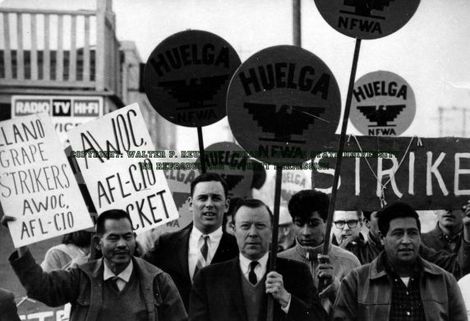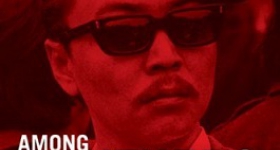
Larry Itliong (left) and Cesar Chavez (far right)
This week marks not only Labor Day but also the 44th anniversary of the Delano Grape Strike: on September 8, 1965, 1,500 Filipino American workers walked off their jobs on grape-growing farms in California in order to demand fair wages and benefits.
It made history. When the Agricultural Workers Organizing Committee, composed mainly of Filipino American workers, merged with the Mexican American-led National Farmworkers Association (NFWA) to form the United Farm Workers of America (UFW), the grape strike grew to include tens of thousands of farm workers and eventually achieved a national boycott. The strike would continue until 1970, and is now known as a linchpin in the the modern farm labor movement. Cesar Chavez and Dolores Huerta, the leaders of the National Farmworkers Association, are well-known and regarded as organizing heroes for immigrant farm workers' rights. But lesser known are the Filipino workers who led and originated the strike efforts and were often marginalized within the union itself -- like Larry Itliong.
Born in the Philippines in 1913, Larry Dulay Itliong immigrated to the US in 1929. He worked in Alaska and California before founding the Filipino Farm Labor Union in 1956. Itliong served as the assistant director of the union that later became the UFW, and eventually as national boycott coordinator. Along with labor leaders Philip Vera Cruz and Pete Velasco, he was instrumental in getting Chavez’s NFWA to join the Delano strike. An alliance between Mexicans and Filipinos had, at first, seemed unlikely -- one initial reason the Filipino workers had gone on strike was that they were being paid thirty cents an hour less than Mexican workers. This pan-ethnic alliance later proved to be a strategy for the strike’s success, recognizing commonalities between both groups' exploitations and ultimately resulting in wage increases, medical benefits, and the establishment of services like the Pablo Agbayani Village for retired farm workers, named after a worker who had died while picketing.
After the Delano Grape Strike, Itliong resigned from the union and became the president of the Filipino American Political Alliance, the first national political Fil-Am organization and a crucial alliance between Filipino professionals and laborers that grew out of the strike. Itliong died in 1977 at the age of 63, leaving behind his wife and seven children. Cesar Chavez spoke at his funeral and called him "a true pioneer in the farm workers movement."
Chavez remains a household name, while Itliong and other Filipino leaders are widely unknown. Yet Filipino farm workers had toiled in the lettuce and asaparagus fields of California for decades, migrating north during the winters to work in Alaska's canneries. They weren’t new to organizing in 1965, either, having been striking and working in farm fields since the 1920s and even maintaining a reputation as being militant and demanding.
History rewrites itself, though, and despite evidence to the contrary, Asian Americans are still falsely perceived as being passive and politically docile. How can we counteract historical amnesia?









Comments